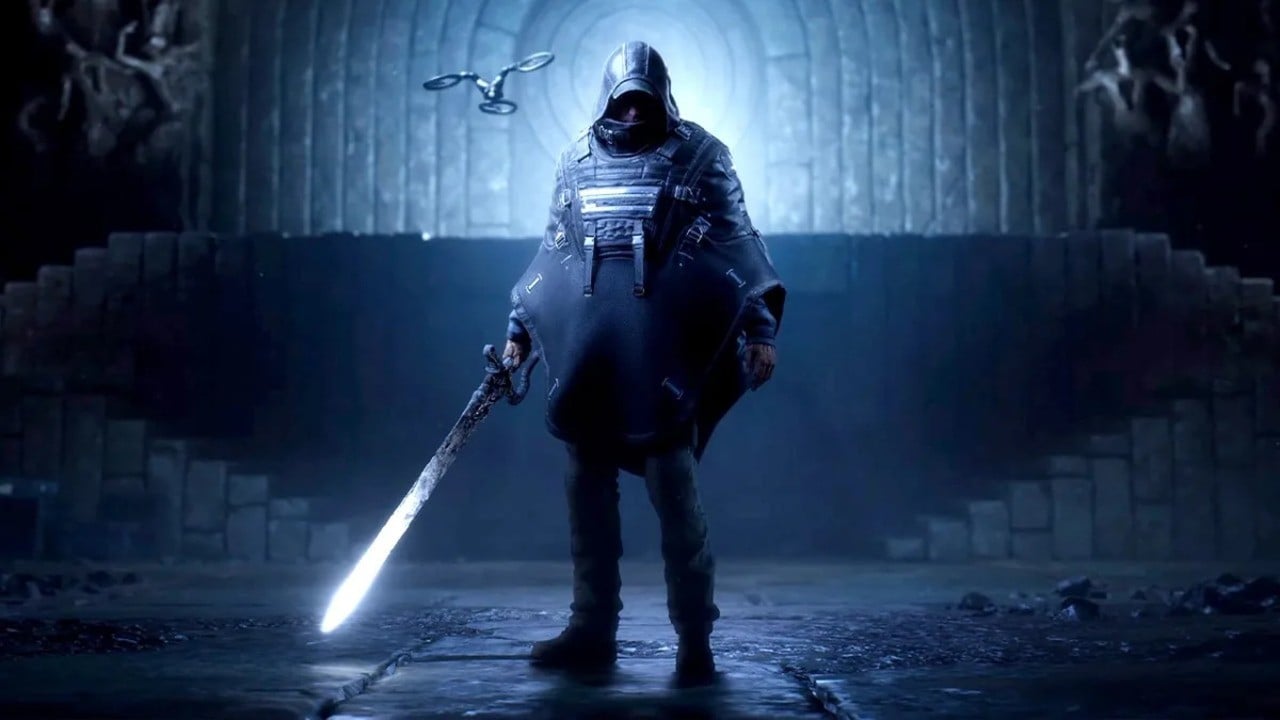The atrocities of Hell Is Us make me wonder if 'real-world' Soulslikes have a future

Content warning for discussion of mass killings, sexual assault and sectarian hatred.
Very early on in Hell Is Us, you come to a village that might as well be titled "War Crimes Theme Park".
The approach takes you past an exposed mass grave, with mud-soaked bodies piled in the shadow of a digger's bucket. A man cradles his lifeless wife and daughter nearby. Down the path, there's a moonlit stretch of swampland full of battered, sunken tanks and dead soldiers. The village occupies a rise in the distance. It's been occupied and looted by a force of Sabinians, one of two groups locked in a bloody struggle with religious roots that, according to developers Rogue Factor, reimagines real-life civil wars from the 1990s.
I have a nice chat with the Sabinian captain - a grizzled and faintly cartoonish figure of obscenity, the kind of readily self-unpacking arsehole you'd expect from a game titled "Hell Is Us". He calls the opposing Palomists "cockroaches" who need to be exterminated or sent to the camps, justifying his own atrocities with the remark that the Palomists have done this much and worse. To right of the captain's lookout post, there's a house where a woman describes being turned into a sex slave as punishment for joining a Palomist lynch mob (it wasn't till I left that I realised the significance of the house being unlocked, in a game where doors tend to be bolted). To the left of the entrance, off-duty firing squad members lounge before a line of recently executed civilians.
Image credit: NaconA Palomist abbot has been strung up at the far side of town: he laments "the spread of hatred from one generation to the next", and is sorry to hear that "the outside world seems to fall prey to the same dark impulses as Hadeans". He asks you to check on a relative of his, a girl hiding in the attic of a shelled house. Hunkered under her blanket by candlelight, she tearfully describes the Sabinians as "not people", and muses on the fate of her family in heaven, "a place that has no memories".
Who are you in amongst all this? A vagrant masquerading as an agent of the "Organised Nations" - a fictional parallel for a UN peacekeeper, with a similar blue Earth logo design, but your mission isn't wholly Earthly.
Their outward political functions aside, the ON peacekeepers are investigating a plague of hollow-bodied monsters. Your slick cowled ON poncho grants you license to visit every region of the war, and involve yourself with everything, though the Sabinian captain makes it clear that he'd shoot you if he could get away with it. You are something akin to the protagonist of a FromSoftware game: a returning exile, at once privileged and ostracised, regarded with loathing and suspicion yet equipped with the power - perhaps, the only power - to intervene in an undead world of self-mobilising violence.
Hell Is Us is fairly redolent of From's work. The melee combat is built around stamina and parries, with a timed health regain system similar to Nioh's pulsing and Bloodborne's rallying. The game doesn't have bonfire mechanics, just holographic, floating manual savepoints that leave slain enemies in place, but it takes some inspiration from the overarching Souls template of a purgatorial landscape in which nothing truly dies.
Image credit: NaconEnemies respawn when you travel away from an area; the only way to shut them down for good is to enter and dispel one of the rippling black domes that house the fossilised trauma of the land's human residents. The monsters are, in other words, rogue manifestations of the country's historical injuries. An early dungeon threads their supernatural origins into the 'real world' context: it takes you through an ancient theocratic black site, where graven stone plaques explain the proper incarceration and processing of 'sinners', then emerges into a recently dug trench network lined by rusting howitzers. The symbols of that dungeon are everywhere in the open world, on murals in towns, on outfits, on the three-part puzzles that might otherwise strike you as casual borrowings from Zelda.
I'm only a few hours into Hell Is Us, and I'm somewhat repelled by its showy nihilism and mystical ideas about historical cycles. Again, it feels cartoonish and didactic. There's wearing your heart on your sleeve and then there's summarising your whole emotional arc in the title. It perhaps doesn't help that you're playing a character performed by Elias "Adam Jensen" Toufexis, his voice all haunted surface and toneless gravitas, the perfect fit for a blockbuster videogame with A Message to deliver. The depiction of that village often feels like atrocity porn, exploitation theatre.
I am, however, interested in the premise of a Soulslike set in something like our historical present, inasmuch as I can't quite believe it hasn't been attempted more often. It makes me wonder anew about the utility of the Soulslike genre as a historical critical instrument, appropriate to an era of "forever wars".
The decades-old Israeli siege, occupation and latter-day invasion of Gaza need no introduction here. The Somali Civil War has been fought since the 1980s. I remember the huge protests on UK streets against the most recent, US-led western invasion of Iraq in 2003; that war and subsequent occupation theoretically ended in 2011, but it arguably continues today in callously framed "low intensity" form, with a diminished western troop presence amid secular "conflict", insurgencies and militias acting on behalf of neighbouring countries.
Image credit: NaconFromSoftware's games harken back approximately to medieval times, but their tales and systemisations of petrified hatred and endless decline, of cataclysmic feuding and of superannuated rulers who refuse to yield power, seem just as available to comparison with the above. As I play Hell Is Us (I can't guarantee I'll have time to fully review it), I'm thinking about how Soulsy mechanics and systems such as bonfires, reclaimable XP, particular kinds of status effect and the running order of new weapons and bosses could be used to explore something as terrible and complex as the war in Somalia.
Probably, this is an absolutely dreadful idea. Based on the few hours I've played, Hell Is Us certainly suggests how it could be done badly. Soulslikes deal in marvelous grotesques, and I'm not sure it's helpful to apply such thinking to real-life dehumanisation and slaughter. But I do have to acknowledge Rogue Factor for going where not even From have quite dared.













